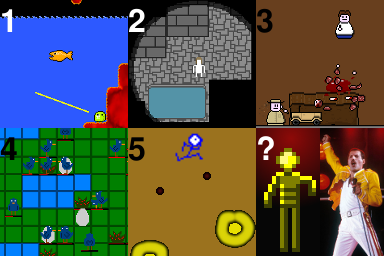First Fifty, Let’s Talk About the Theme
, Ludum Dare, Review
Okay LD-ers, you've actually had quite a long time to think about the theme this time, not just the 48 hours. That said, I've categorized games into 7 categories based on how they examine the "evolution" theme. I'll pick five good games from the fifty that I've played for examples. To clarify: I'm picking games based on whether they represent these categories.

- Munch and evolve (7/50): In quite a few games, you play a critter which has to eat things in order to evolve into better things. I’m choosing Nom’s Evolvathlon to represent this category. This is the "movie science" version of evolution—totally not how evolution works, but no matter. I like Nom’s Evolvathlon because you have to evolve the right set of abilities to eat everything on the board. This category also includes "Osmos" clones (3/50), and by extrapolation we can conclude that there are 84 Osmos clones in the contest.
- Evolution as cultural topic (3/50): You don’t have to incorporate the theory of evolution when you can work with evolution as a cultural phenomenon. Evidently chose this route and made me laugh harder than I’ve laughed all week. These games usually play Church versus Science, perhaps in an utterly ridiculous way.
- Upgrades (11/50): If you’re having trouble matching the theme, you can always think of upgrades as a kind of evolution. This gives you a lot of flexibility since just about anything can be an "upgrade". I’ve chosen A Castle in the Desert for this category, which is a fun game but uses a broad interpretation of evolution. It has an impressive gameplay script.
- Simulation (4/50): Some people made a valiant effort to actually simulate some evolutionary process, and Galapagos is a great example. You’re influencing the evolution of birds, but I managed to make the simulation go horribly wrong—I gave the birds too much food at once, which lead to overpopulation. They wiped out the food supply and completely died off. That’s what I love about simulation games—they embrace emergent behavior.
- Evolution of the game (3/50): And some brave participants decided that it would be the game itself that evolves. Stevie Asteroid Rescues the Hovercredits is a great example in this category—at first it looks like the most horrible, primitive game. Then you get to the next level and suddenly the graphics and music are better—they keep getting better as you get farther in the game. Now you have to understand the reason I say brave here is because if you took this route, you basically committed to making multiple games during the contest. It’s hard enough to make one!
- And finally, I think the sprite from my game, Digital Generation looks like Freddy Mercury wearing a space suit. Or something. The walking animation is more like a pelvic-thrust dance animation than anything else. (Incidentally, my game is also in category #5… and stringing together multiple games drove me crazy!)
The sixth category is none/background (21/50): for some games, evolution only really appears in the background, and you’ll miss it if you don’t pay attention to the text that scrolls by. Or evolution isn’t relevant to the game at all. I’ve played a few platformers this time where you just jump to the level end… I think if you can string a few words together you can make a platformer about anything.
And the final category is unique (1/50): games that I feel just don’t belong in other categories. The example I have is Vesuvius, which takes a "what does not kill you makes you stronger" approach to the game.
Well, time for bed, then I can play another 50 games…